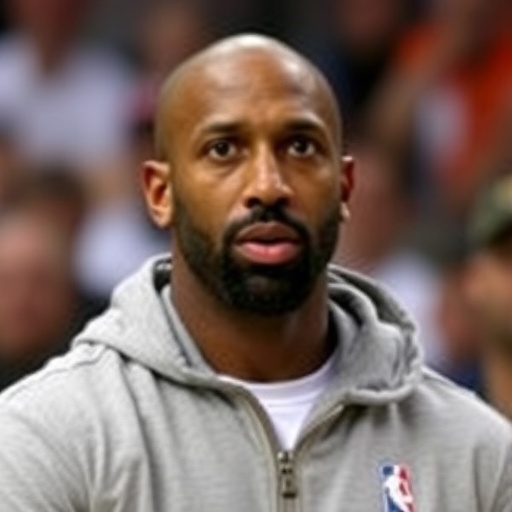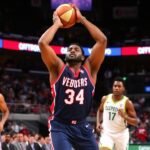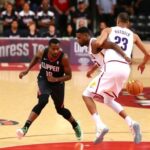NBA Coach Chauncey Billups Arrested in FBI Illegal Gambling Probe Shaking Sports World
In a stunning development that has sent shockwaves through the basketball community, former NBA champion Chauncey Billups, now head coach of the Portland Trail Blazers, was arrested Wednesday morning as part of a sprawling FBI investigation into illegal gambling operations with deep ties to game-fixing and organized crime. The arrest, executed at his Portland-area residence, marks a dramatic fall for the Hall of Famer whose career once symbolized resilience and leadership on the court.
- From Pistons Point Guard to Coaching Spotlight: Billups’ Storied Path
- FBI’s Multi-Year Gambling Probe Exposes Organized Crime Links
- Game-Fixing Allegations Threaten NBA’s Betting Boom
- Unsealed Documents Detail Billups’ Alleged Role in the Scandal
- NBA’s Future Under Scrutiny: Reforms and Lingering Questions
Billups, 47, faces federal charges including conspiracy to engage in illegal gambling, wire fraud, and association with racketeering activities, according to sources close to the investigation. The FBI’s gambling probe, which has been underway for over two years, has already netted more than a dozen indictments across the sports betting underworld, but Billups’ involvement has elevated the case to national prominence. Authorities allege that the probe uncovered a network manipulating outcomes in professional and college sports, with gambling rings raking in tens of millions of dollars annually.
This isn’t just another athlete caught in a betting scandal; it’s a direct threat to the integrity of the NBA, especially as legalized sports betting explodes across the U.S. following the 2018 Supreme Court decision to strike down the Professional and Amateur Sports Protection Act (PASPA). With states like Oregon legalizing sports wagering as early as 2019, the line between legitimate betting and illicit schemes has blurred, making cases like this a wake-up call for leagues and regulators alike.
From Pistons Point Guard to Coaching Spotlight: Billups’ Storied Path
Chauncey Billups‘ journey to the pinnacle of basketball is the stuff of legend. Drafted third overall by the Boston Celtics in 1997, he quickly earned the nickname “Mr. Big Shot” for his clutch performances, most notably leading the Detroit Pistons to the 2004 NBA Championship with a Finals MVP award. Over his 17-year playing career, Billups amassed five All-Star selections, three All-NBA honors, and a reputation as one of the league’s most cerebral floor generals.
Transitioning to coaching, Billups took the helm of the Portland Trail Blazers in 2021 after a stint as an assistant with the Los Angeles Clippers. Under his guidance, the Blazers have shown flashes of potential, finishing the 2022-23 season with a 33-49 record amid a youth movement. Players like Anfernee Simons and Shaedon Sharpe have praised Billups’ mentorship, with Simons telling reporters last season, “Coach Chauncey brings that championship mentality every day—it’s infectious.”
But whispers of off-court troubles began surfacing in recent months. Insiders in the NBA coaching circles noted Billups’ occasional absences and a more reclusive demeanor, which some attributed to the pressures of the job. Now, those signs appear tied to the deeper undercurrents of the FBI’s gambling probe. Court documents unsealed today reveal that federal agents had been monitoring Billups’ communications since late 2021, after tips from informants in Las Vegas betting parlors pointed to high-stakes wagers linked to NBA insiders.
Billups’ arrest isn’t isolated; it’s part of a broader pattern in professional sports where former players leverage their networks for illicit gains. According to a 2023 report by the American Gaming Association, illegal sports betting in the U.S. totals an estimated $150 billion annually, dwarfing the $10 billion in legal wagers. For someone like Billups, whose post-retirement earnings from coaching hover around $7 million per year, the allure of quick money through gambling rings could prove tempting, though his legal team has already vowed a vigorous defense.
FBI’s Multi-Year Gambling Probe Exposes Organized Crime Links
The FBI’s gambling probe, codenamed Operation Fair Play, launched in 2021 amid rising concerns over sports betting integrity post-PASPA repeal. What started as a localized investigation into underground bookies in Nevada and New Jersey has ballooned into a nationwide effort, involving over 200 agents and collaborations with the Department of Justice, IRS, and international law enforcement.
At its core, the probe targets a syndicate allegedly run by figures connected to Eastern European organized crime families, who used encrypted apps and offshore accounts to facilitate bets on manipulated games. Federal indictments detail how the ring placed wagers exceeding $50 million on NBA, NFL, and college basketball outcomes between 2019 and 2023, with profits laundered through cryptocurrency exchanges and shell companies.
FBI Director Christopher Wray, in a rare public statement on the case, emphasized the probe’s scope: “Illegal gambling isn’t just a victimless crime—it’s a corrosive force that undermines the trust in our sports and erodes public confidence. We’re committed to dismantling these networks wherever they hide.” Sources indicate that wiretaps captured conversations linking mid-level operatives to NBA personnel, including vague references to “inside info from a coach who’s seen it all.”
Statistics underscore the probe’s urgency. A 2022 NCAA study found that 25% of Division I athletes reported knowledge of gambling on campus, while the NBA’s own integrity hotline received over 500 tips last year alone. In Billups’ case, investigators claim he provided non-public information on player injuries and game strategies, allegedly in exchange for a cut of the winnings—potentially up to $500,000 over two seasons.
The operation has already led to seizures worth $20 million in assets, including luxury vehicles and real estate tied to the suspects. As the probe deepens, questions swirl about how far the tentacles reach into professional leagues, with anonymous sources hinting at possible involvement from other NBA figures yet to be named.
Game-Fixing Allegations Threaten NBA’s Betting Boom
The intersection of Chauncey Billups’ arrest and the NBA’s embrace of sports betting couldn’t be more ironic. The league, under Commissioner Adam Silver, has partnered with betting giants like DraftKings and FanDuel, generating over $200 million in sponsorship revenue since 2019. Silver himself advocated for legalization in a 2014 New York Times op-ed, arguing it could foster transparency.
Yet, the FBI’s gambling probe paints a darker picture, alleging game-fixing schemes that echo the 2007 Tim Donaghy referee scandal. In that case, the NBA’s former official admitted to betting on games he officiated, leading to his imprisonment. Billups’ alleged role—providing tips rather than directly influencing play—represents a new evolution in sports corruption, exploiting the flood of legalized betting data.
Experts like Marc Edelman, a sports law professor at Baruch College, weighed in on the implications: “This probe highlights a vulnerability in the post-PASPA era. With billions wagered legally, the incentive for insiders to cross lines increases exponentially. Billups’ situation could force the NBA to tighten monitoring of coaches and executives.”
League sources confirm the NBA is cooperating fully with the FBI, with internal audits underway. The Blazers organization released a statement: “We are shocked and disappointed by these allegations. Coach Billups has been placed on administrative leave pending the outcome of the investigation.” Players’ reactions have been mixed; Damian Lillard, now with the Milwaukee Bucks, posted on social media, “Hoping for the truth to come out—Chauncey was a brother on the court.”
Broader data reveals the stakes: A 2023 survey by the National Council on Problem Gambling estimated 2.5 million Americans face severe betting addiction risks, amplified by easy app access. If proven, Billups’ involvement could result in a lifetime ban from the NBA, similar to the penalties faced by Pete Rose in baseball.
Unsealed Documents Detail Billups’ Alleged Role in the Scandal
Court filings made public following Billups’ arrest provide a chilling timeline of his purported entanglement in the gambling probe. According to the 45-page affidavit, FBI surveillance began after a confidential informant—a former bookmaker—flipped in 2022, naming Billups as a key contact in the NBA betting circuit.
Key evidence includes text messages from a burner phone traced to Billups, discussing “safe plays” on Blazers games. One exchange, dated January 2023, reads: “Lineup changes incoming—bet heavy on under for Q3.” Prosecutors link this to a $250,000 wager that paid out after Portland’s star player sat out unexpectedly due to a “minor injury.”
Billups’ attorney, high-profile defense lawyer Alan Dershowitz, countered in a press conference: “My client is innocent of these baseless charges. Chauncey Billups has dedicated his life to basketball; this is a witch hunt by overzealous agents.” Yet, the documents paint a network involving at least five other sports figures, including a retired NFL coach and two college recruiters, all allegedly funneled through a Las Vegas intermediary.
Financial trails bolster the case: Bank records show unexplained deposits of $300,000 into accounts linked to Billups’ family trust between 2021 and 2023, coinciding with peak betting seasons. The probe also uncovered ties to organized crime, with one suspect identified as a lieutenant in a Bulgarian syndicate known for cyber-fraud operations.
As Billups awaits arraignment in federal court in Portland, the NBA faces mounting pressure to disclose its internal findings. League officials have reportedly briefed owners on potential ripple effects, including sponsor pullouts if the scandal widens.
NBA’s Future Under Scrutiny: Reforms and Lingering Questions
The arrest of Chauncey Billups has ignited calls for sweeping reforms in how the NBA polices gambling among its personnel. With the 2023-24 season underway, the league is considering mandatory ethics training expansions and AI-driven monitoring of communications, as proposed by the NBA Players Association.
Looking ahead, the FBI’s gambling probe could yield more arrests, with sources indicating ongoing interrogations of NBA staffers. For the Blazers, the immediate challenge is stabilizing the team; assistant coaches will lead practices, but morale is low amid the uncertainty.
On a national scale, this scandal may accelerate federal legislation. Bills like the Sports Wagering Market Integrity Act, introduced in Congress last year, aim to standardize oversight and impose harsher penalties for insider betting. As one betting analyst noted, “Legalization was meant to clean up the game, but cases like Billups’ show the shadows persist.”
The basketball world watches closely, wondering if this is the tip of the iceberg. Will the NBA emerge stronger, or will trust in the game erode further? Only time—and the courts—will tell, but one thing is clear: the era of unchecked sports betting is under fierce examination.








